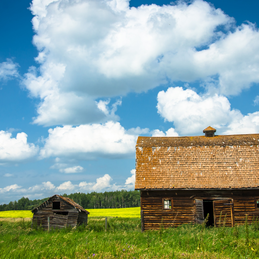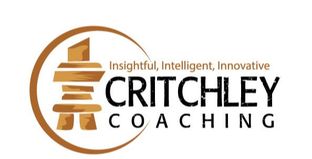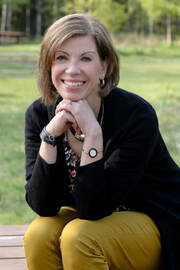
Things in Ontario are older than they are here in Alberta, including the barns. Many of them have been restored over the years, allowing them to continue to function as valuable parts of the farms they stand on. I’m guessing people often identified the owners of farms based on the barn that was on the property. These unique buildings serve as landmarks to the locals.
I’m not sure where my fascination with barns started but I’m guessing it goes back to spending our summer holidays in New Brunswick, on Uncle Roy and Aunt Muriel’s farm, where the dairy barn was a central feature. We had a lot of adventures and made a lot of memories in that barn. We ‘helped’ milk the cows in the days when my Grampy still milked by hand, sitting on his sturdy, little milking stool. We helped put hay into the hayloft. We found new batches of kittens. We watched new calves enter the world. And every summer, at least once, we attempted a sleep-out in the barn.
I remember hearing stories from my Grammie about events in the barn. She told me about the time she was raising her family and one day went into the barn. As she entered the big door to the hayloft, she spotted one of her boys (either my dad or one of my uncles) walking across a beam, high above the barn floor. She explained how, although she felt panicked and terrified, she knew that if she called out to them to tell them to get down, they might lose their balance and fall. She stepped back outside the door and held her breath as they finished their dare-devil feat. I’m guessing there may have been some words exchanged once the danger had passed but I loved hearing this story and having the feeling that the barn was like one of the characters in my family.
As we passed some of the beautiful barns last week, I could just imagine some of the stories that could have been told by them if they could talk. Once in a while, especially in places when we turned off Hwy 401 into a smaller community, we would see an abandoned barn. Often, finding itself empty, the barn would have begun to sag and even fall.
I mentioned this to my brother and he said, ‘Yes, barns don’t do well when they are empty’.
I wondered why this was so. The barn is, after all, a non-living thing. It is an object. And yet, it serves a vital purpose on a farm. It is used to give shelter to animals. It is a place to store hay and straw, both needed for those animals’ livelihood. It provides a space for machinery to be stored and repaired. It is a birthplace for so much new life. I think if barns could talk, they could reveal some of the most secret thoughts and dreams of farmers and their visiting nieces; they are wonderful keepers of secrets.
It is as if when it is being used, when it feels needed, a barn takes on almost a human quality. It stands proud. It wants to hold up its part of the relationship. It is as if the barn might say, as long as you continue to fill me up, I will support you too. There is a beautiful tension between the barn and the life it holds; each supporting the other.
There is a similar tension in other parts of our lives too; in the more visibly human parts. Every single one of our relationships holds up best when there is an equal giving and taking from each partner. When one partner counts on the other for support, the support is almost always available. And when the roles are reversed, the same is true. But as soon as one partner stops ‘filling the barn’, when the relationship becomes empty, the barn becomes less stable. And as time goes on, and the barn recognizes it is no longer needed, it ceases to stand strong.
So too it is with promises. When we say we will do something and we carry through with our commitment, we strengthen the trust between us and others. When we regularly stop fulfilling our promises, when they become empty, so too do the relationships they once supported.
And whatever the word is for the part of us that gives or helps others, when that part of us is busy giving and helping, it somehow keeps us upright and strong and proud. When we cease to believe we have anything left to give, when our barn feels empty, it is much harder to believe we have an important role in this world.
I stand most upright, strong and proud when I recognize my value in my little world. I am at my best when I stand in integrity, when I participate fully in relationships, when I give to others and when I accept from others. I feel best when I know I can be of support to others who might need support. And I feel great comfort when I know I can count on the support of others. This farm girls understands that people, like barns, do best when the tension is perfect; when the give and take dance in perfect unison.
My inquiry for you this week is, ‘What is the state of my barn?’
Elizabeth is a certified, professional Life and Leadership Coach, and the owner of Critchley Coaching. She is the founder and president of the Canadian charity, RDL Building Hope Society. She works with corporations, non-profits and the public sector, providing leadership and personal coaching for individuals and teams. She creates and facilitates custom workshops for all sizes of groups. Contact Elizabeth to learn how to keep your barn standing proudly.


 RSS Feed
RSS Feed